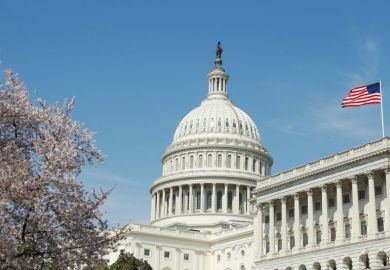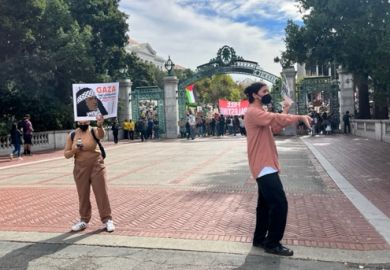Facing their toughest-ever nationwide tests of academic freedom, some US institutions are slowly trying to move past questions of intrusive donors and violent protests by teaching more directly about tolerance.
While many of the nation’s campuses remain convulsed in demonstrations, threats, and arrests relating to the Israel-Hamas conflict, several of them – including Harvard University, Dartmouth College, New York University and the University of Virginia – have stepped forward with educational programmes aimed at students, faculty and staff.
Virginia plans a series of public presentations by experts on Middle East politics and global conflicts. Its aim is to “encourage the free sharing of beliefs and ideas, regardless of political leaning”, said provost Ian Baucom.
Harvard’s president, Claudine Gay, promised education and training programmes aimed at “protecting all members of our community”, although she put particular emphasis on confronting “antisemitism in daily life”. NYU is creating a Center for the Study of Antisemitism, while Dartmouth started educational forums on the conflict almost immediately after the initial Hamas attack.
Signs of US higher education remembering and prioritising its teaching role in the face of flaring Israeli-Palestinian violence remain too rare, said Suzanne Nossel, chief executive of PEN America, a writers’ group that has become a leading voice for campus free speech protections.
“That has to be a much more deliberate, intentional part of the university experience, because we’re seeing that it’s really not working as is,” Ms Nossel said.
“That has been something of an afterthought. I think the idea has been, you just bring everybody together on campus and that kind of interchange is going to naturally come about. And we’re seeing that’s not happening.”
On many campuses, in fact, the mistrust and retaliation seem only to be intensifying. There have been dozens of arrests nationwide, including a Cornell University student accused of threatening to kill Jewish students, a University of Massachusetts Amherst student accused of punching a Jewish student and spitting on an Israeli flag, and two pro-Palestinian Dartmouth students who camped out on a campus lawn.
Columbia University suspended and defunded its chapters of Students for Justice in Palestine and Jewish Voice for Peace for their participation in events such as a mass walkout from several classes, including one taught by former secretary of state Hillary Clinton.
Brandeis University also banned its Students for Justice in Palestine chapter, accusing it of openly supporting Hamas. A physician at NYU’s Langone Health medical centre was removed from his position after reposting a social media message encouraging Palestinian resistance. A Harvard proctor was reportedly relieved of his duties after being involved in a confrontation at a pro-Palestine protest.
And wealthy donors continue to throw around their weight, typically on the side of Israel. One of the latest, billionaire investor Henry Swieca, resigned from the board of Columbia’s business school, complaining about “blatantly anti-Jewish student groups and professors allowed to operate with complete impunity” on campus.
The American Association of University Professors, the chief US faculty grouping, chided US universities for responding to the protests and donor threats with “political censorship” rather than remembering “the academic community’s central mission of education, research, and service to the broader society and to the public good”. It made particular note that it “rejects the characterisation of pro-Palestinian speech or critiques of the Israeli state as invariably antisemitic”.
The Biden administration also tried to calm the situation by formally warning college and university leaders nationwide that they have a legal obligation to provide all students with an educational environment free from discrimination.
Register to continue
Why register?
- Registration is free and only takes a moment
- Once registered, you can read 3 articles a month
- Sign up for our newsletter
Subscribe
Or subscribe for unlimited access to:
- Unlimited access to news, views, insights & reviews
- Digital editions
- Digital access to THE’s university and college rankings analysis
Already registered or a current subscriber? Login








